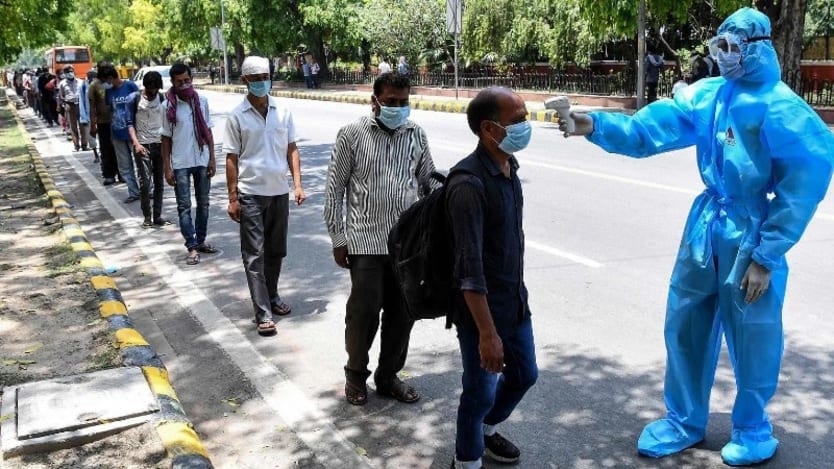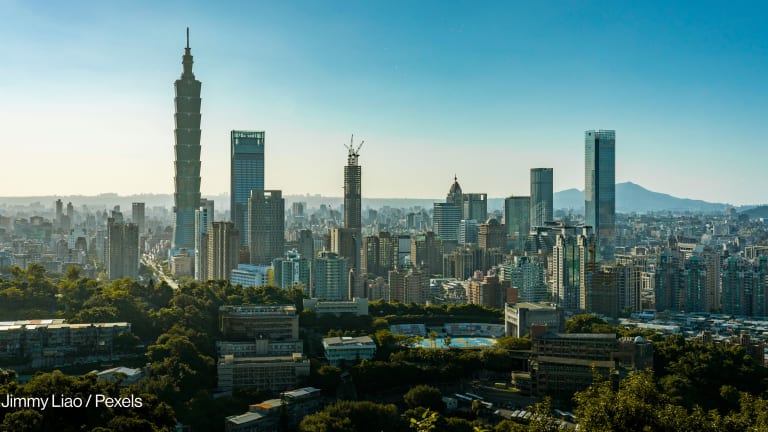
NEW DELHI — Azhar Ali runs an NGO in India’s Uttar Pradesh state, focused on women from the Dalit and Muslim communities. Over the last three months, he has witnessed almost all of its funding dry up and has had to lay off 66 people, keeping only nine on a part-time basis.
Opinion: How can India address big surge for health care after coronavirus lockdown?
India needs a plan to address the pent-up demand for health care from the lockdown without compromising other interventions for the coronavirus. This op-ed discusses what that plan could look like.
As COVID-19 cases in India near 1 million — making it the third-worst-affected country in the world, after the U.S. and Brazil — experts say relief efforts are being thwarted due to the opaque nature of a centralized fund operated by the government.
The Prime Minister’s Citizen Assistance and Relief in Emergency Situations Fund, or the PM CARES Fund, was announced in March, and the amount raised so far has been kept under wraps. According to some estimates, the fund has collected over $1 billion, diverting significant resources from smaller NGOs — especially those working in remote areas.
“We used to get funds from INGOs, but they decided to donate to the PM CARES Fund instead and have cut our funding. The community needs us the most now, so we used our own personal money to buy ration for needy families,” Ali, secretary of New Indian Women Development Association, told Devex over the phone from Ballia district in Uttar Pradesh.
Many experts have expressed concern that private companies and national and international foundations were forced to donate to the PM CARES fund, leading them to discontinue projects that they had committed to. Representatives of many small NGOs from across India, such as Ali’s, told Devex they are reeling from the impact of canceled funding.
“There is overt and covert pressure to toe the line and donate to the PM CARES Fund. What that has done effectively is take about a billion dollars out of the civil society spectrum and into the government system,” said Ingrid Srinath, director of the Centre for Social Impact and Philanthropy at Ashoka University.
From CSR to PM CARES
In 2013, India passed a law mandating that private companies donate 2% of their net profit toward corporate social responsibility, or CSR. This has given India about $2.2 billion per year to utilize for social causes. Of that amount, more than half has been allocated to COVID-19 relief measures, according to some estimates.
Smaller NGOs that form the “bottom of the supply chain of the development sector” are the most impacted, said Pradeep Narayanan, director of research and capacity building at Praxis, a development research organization.
Remote communities often rely on community-based organizations to access programs for health, education, and livelihoods. “There is a need to sustain them, protect them. Once this architecture on the ground level gets dismantled, it is going to affect the entire sector,” Narayanan said.
Ali’s NGO, for example, had an annual budget of $33,000 and is now only left with $4,000 after the funding cuts.
“Our work on women’s health, immunization, and family planning has completely stopped,” Ali said.
Narayanan said that even though the mandatory CSR contribution was set up to encourage corporate giving in India, it has negative implications for the kinds of projects that are supported.
In the past, too, projects that were favorites of the government got funded — from building toilets to cleaning up the Ganges to building cowsheds, he said. NGOs have accused Prime Minister Narendra Modi’s government of being hostile — in the last six years, over 13,000 NGOs’ licenses were canceled, and the government has cracked down on foreign funding.
Because of this history and added pressure over the last four months, Srinath said that both private companies and foundations are weighing the pros and cons of the choice to donate to the PM CARES Fund or to ensure the sustainability of their own programs. There is also the fear of retaliation.
“People are making trade-offs. The fear is justified — it is not paranoia. So in that way, it is an effective strategy to get people to contribute,” she said.
“There is overt and covert pressure to toe the line and donate to the PM CARES Fund.”
— Ingrid Srinath, director, Ashoka University Centre for Social Impact and Philanthropy“Organizations are now competing with each other to show how close they are to the establishment,” Narayanan said.
The impact this has had on COVID-19 relief and on other issues that have been ignored is enormous.
“Where you need the response to be localized and agile, what you have done is taken a large sum of money and diverted it into highly centralized, highly nonagile kind of response mechanisms,” Srinath said.
While retail giving from individuals peaked in the initial months, that is now tapering off, leaving a gap in the demand with no avenues for supply.
“The need is so huge, and people have [already] given on an unprecedented scale. So we could be seeing a major crisis in funding. We think that, overall, we could be looking at NGOs losing somewhere up to 50% of their revenues in the coming 12 months. We think there will be massive job losses across NGOs — some 2 million jobs will be lost across the sector,” Srinath said.
Even some of the bigger organizations are already witnessing job losses. Piramal Foundation, which works in rural development, laid off more than 250 people in June. What was surprising to the staff was that the foundation’s parent company, Piramal Group, donated $3.8 million to the PM CARES Fund but told foundation staffers that it was facing a funding crunch.
A former program manager who worked on rural governance issues at Piramal Group was told in June that there was no funding to support their projects.
“The communities who trusted us for so long feel like we’re betraying them.”
— Azhar Ali, secretary, New Indian Women Development Association“Some projects were merged, and some people were laid off. But how could they donate to the PM CARES Fund and say they don’t have money to support their own people? We believe that more lives could have been improved if the money had been utilized through the foundation," the former employee told Devex.
But while organizations are balancing the urgent demand for coronavirus relief funds with retaining staff members and projects, the government’s preference is clear.
A study conducted by the Centre for Social Impact and Philanthropy surveyed 52 nonprofit organizations across thematic areas, size, and geography, finding that most expected to see budget cuts.
One of the repercussions of the focus on the PM CARES Fund is that CSR managers within private companies have lost control of the budget, Srinath said. “The budget is now getting controlled by promoters and CEOs rather than the professionals who had been entrusted with the money, causing long-standing relationships of trust and of convictions in those organizations to be severely affected.”
NGOs face an ‘existential crisis’
Some experts argue that the centralized response enabled the delivery of economies of scale, helping the government procure large amounts of oxygen cylinders, personal protective equipment, and ventilators where needed and set up large quarantine centers and hospitals.
However, so far, only $410 million has been announced for the purchase of ventilators, care of migrant laborers, and supporting vaccine development.
“NGOs are facing an existential crisis. Many are now speaking to the government to see if some part of the fund could get programmed for the social sector,” said Pritha Venkatachalam, a partner at The Bridgespan Group.
Venkatachalam is trying to inform government stakeholders of the heightened sector needs and financial stresses to enable some funds to get allocated to NGOs for COVID-19 response and recovery. A meeting between NITI Aayog — the government’s policy commission — and several NGOs, along with Bridgespan, was held in the last week of June, and a decision on whether funds can be distributed to NGOs is awaited, she said. Devex’s inquiries on the lack of transparency in the utilization of funds have gone unanswered.
She acknowledges that the question of how the allocation of funds to NGOs will be executed is critical. “There will be a large queue of NGOs that will need support. So a due diligence process and transparent screening mechanism will be required,” she added.
Meanwhile, smaller NGOs such as Ali’s are relying on volunteers to ensure that the progress from the last decade is not wasted.
“The INGOs we worked with want us to ensure sustainability without any money. The communities who trusted us for so long feel like we’re betraying them. We are caught in the middle,” he said.
Update, July 17, 2020: This article was amended to clarify details of sourcing.








